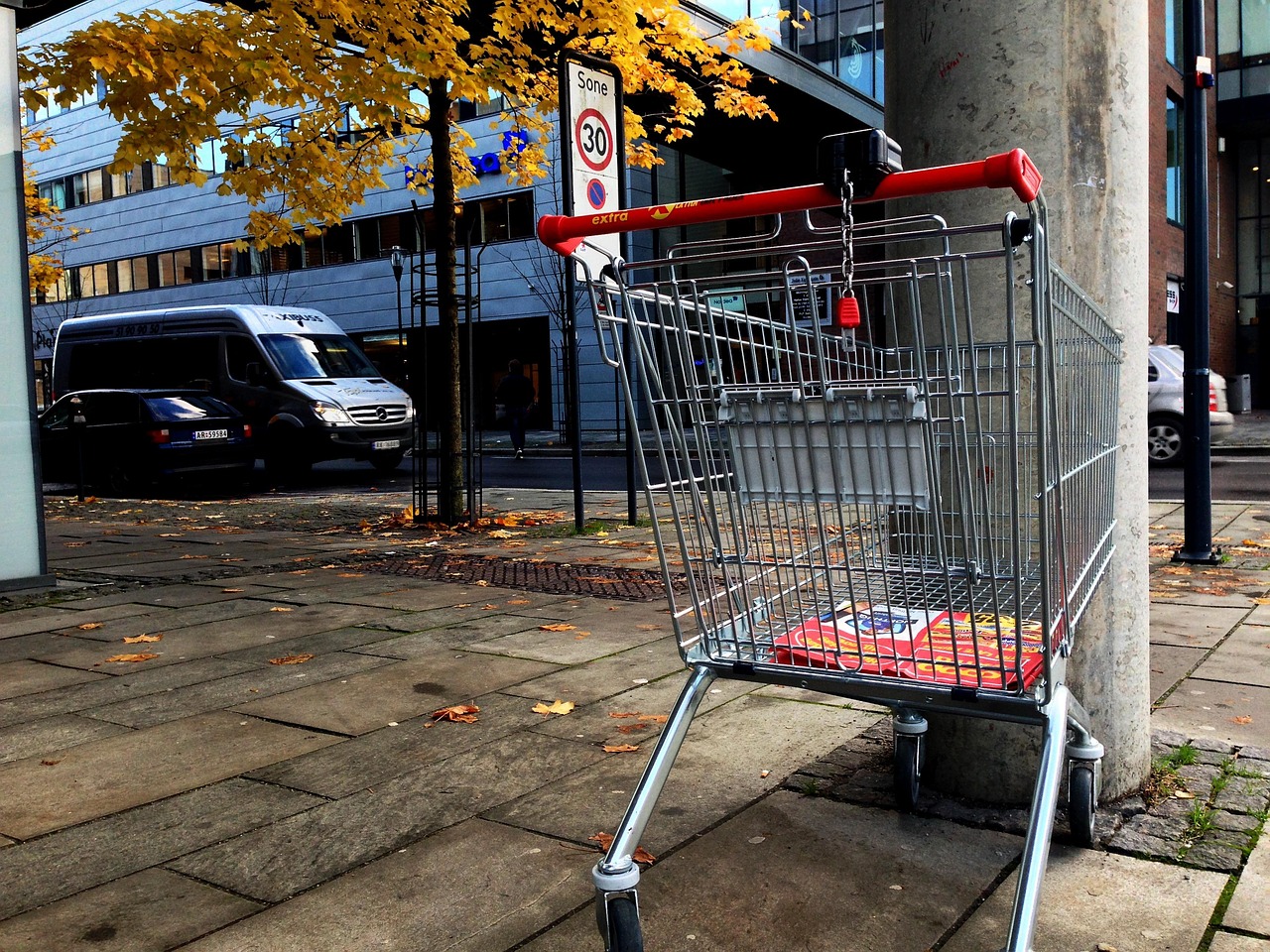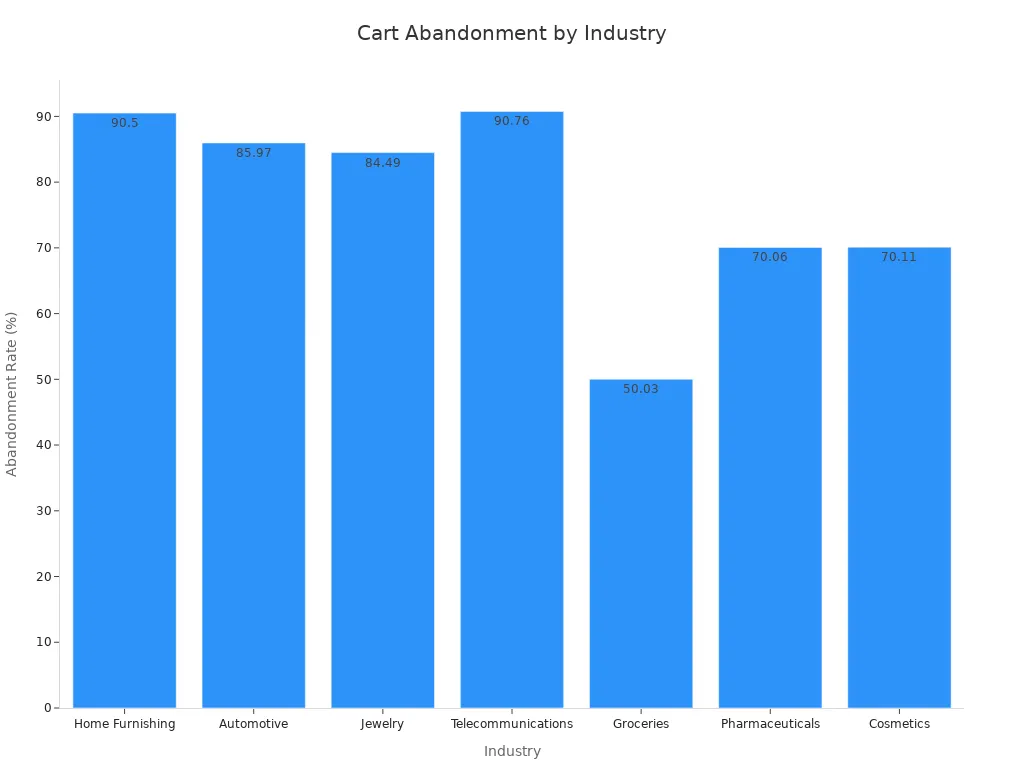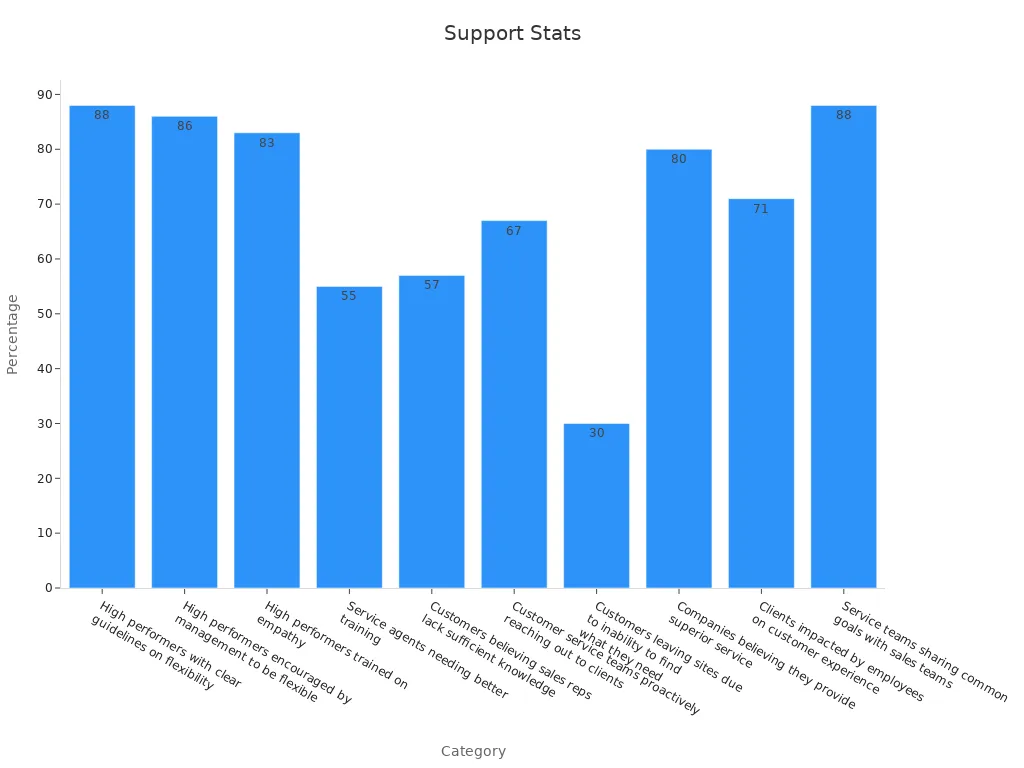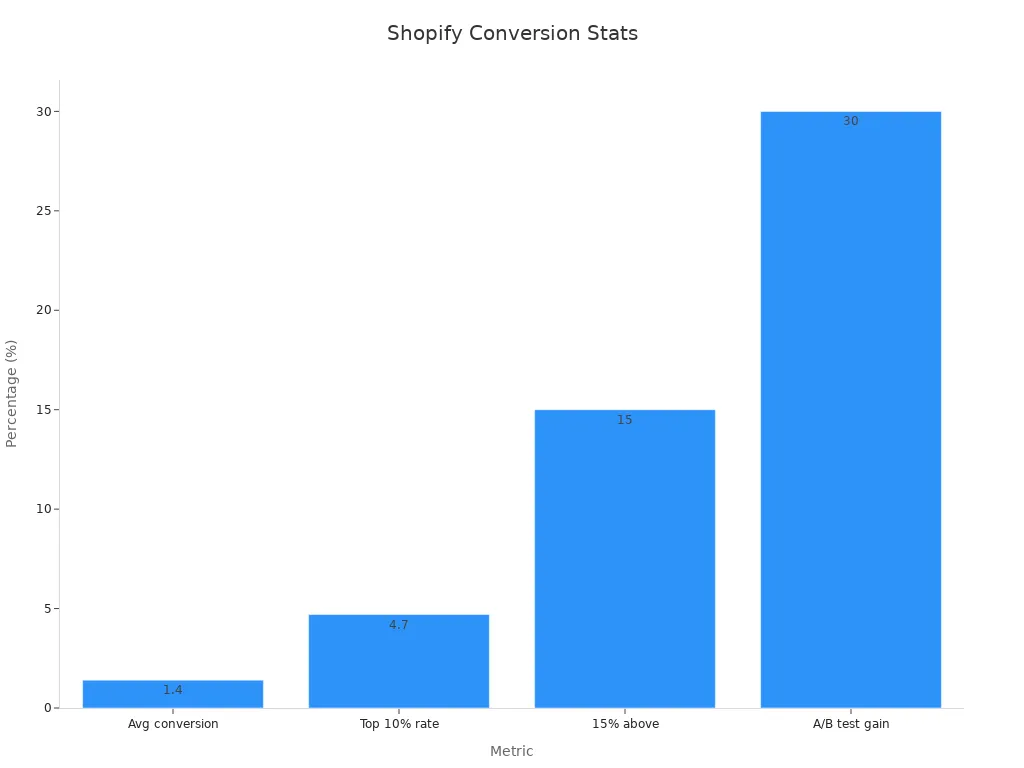How to Choose the Right Shopping Cart Shop for Your Retail Business

Choosing the right shopping cart can make or break your retail business. A well-designed shopping cart doesn’t just simplify the buying process—it transforms the entire customer experience. Did you know that nearly 70% of carts are abandoned because the design fails to meet customer expectations? And if the checkout process feels complicated, 74% of shoppers might never return. That’s why investing in a dynamic, user-friendly solution is vital.
Innovative options like Cloudpick’s Unmanned Store take this a step further. Over six months, this AI-powered marvel handled more than 6,000 transactions while delivering a seamless, contactless experience to 1,367 unique users. It’s proof that modern shopping carts don’t just enhance efficiency—they redefine how customers shop.
Key Takeaways
Picking the right shopping cart can help your business a lot. A simple design makes customers happy and stops them from leaving.
Look at different shopping cart types—SaaS, hosted, self-hosted, and open-source. Choose the one that matches your needs and skills.
Focus on features like safe payments, easy connections, and good support. These make things run smoothly and help customers trust you.
Think about making changes and growing your cart as your business grows. Custom options can keep customers coming back and boost sales.
Check out new ideas like AI shopping carts to save time and improve shopping. These tools can make your store stand out from others.
Understanding the Types of Shopping Carts

When it comes to running your retail business, choosing the right type of shopping cart is crucial. Each option offers unique features and benefits, so understanding them can help you make the best decision for your needs. Let’s dive into the most common types of ecommerce shopping carts.
SaaS Shopping Carts
SaaS (Software as a Service) shopping carts are cloud-based solutions that simplify the process of setting up and managing your online store. These platforms handle everything for you, from hosting to updates, so you can focus on growing your business. Popular examples include Shopify and BigCommerce.
With a SaaS shopping cart, you don’t need technical expertise. The platform takes care of maintenance, security, and scalability. Plus, you’ll have access to a wide range of templates and integrations to customize your store. However, these services usually come with a monthly subscription fee, which can vary depending on the features you need.
Tip: If you’re just starting out or want a hassle-free solution, a SaaS shopping cart might be your best bet. It’s perfect for small to medium-sized businesses looking for a quick and easy setup.
Hosted Shopping Carts
Hosted shopping carts are another popular option for ecommerce businesses. Unlike SaaS solutions, hosted carts give you more control over your online store while still providing essential services like hosting and security. This makes them a great middle ground between SaaS and self-hosted options.
One of the biggest advantages of hosted shopping carts is their ability to provide detailed insights into your business performance. Key performance indicators (KPIs) like conversion rates, average order value, and cart abandonment rates can help you fine-tune your strategy. These metrics are essential for understanding how well your online store is performing and where you can improve.
Here’s a quick look at cart abandonment rates across different industries to highlight the importance of choosing the right shopping cart:
Industry | Average Cart Abandonment Rate |
|---|---|
Home Furnishing | |
Automotive | 85.97% |
Jewelry | 84.49% |
Telecommunications | 90.76% |
Groceries | 50.03% |
Pharmaceuticals | 70.06% |
Cosmetics | 70.11% |

Note: Hosted shopping carts are ideal for businesses that want more control without the complexity of managing everything themselves.
Self-Hosted Shopping Carts
If you’re looking for complete control over your ecommerce shopping cart, a self-hosted solution might be the way to go. With this option, you’ll host the software on your own server, giving you full access to the code and the ability to customize every aspect of your online store.
Self-hosted shopping carts are perfect for tech-savvy entrepreneurs or businesses with specific requirements that off-the-shelf solutions can’t meet. Platforms like Magento and WooCommerce are popular choices in this category. They offer unmatched flexibility, but they also require more effort to set up and maintain. You’ll need to handle hosting, security, and updates yourself, which can be time-consuming.
Pro Tip: If you have a dedicated IT team or a strong technical background, a self-hosted shopping cart can give you the freedom to create a truly unique online store.
Open-Source Shopping Carts
Open-source shopping carts give you complete freedom to customize your online store. These platforms provide access to the source code, allowing you to tweak every detail to match your business needs. If you’re someone who loves flexibility and control, this type of shopping cart might be your perfect match.
Popular open-source options include platforms like PrestaShop and OpenCart. They’re free to download and use, which makes them an attractive choice for businesses on a budget. However, keep in mind that “free” doesn’t mean zero cost. You’ll need to invest in hosting, security, and ongoing maintenance. Plus, if you’re not tech-savvy, you might need to hire a developer to help with setup and customization.
Here’s why open-source shopping carts stand out:
Unlimited Customization: You can design your store exactly how you want it.
Community Support: Many open-source platforms have active user communities where you can find tips, plugins, and troubleshooting advice.
Cost-Effective: While there are some expenses, you won’t pay monthly subscription fees like with SaaS solutions.
That said, open-source shopping carts require a bit more effort on your part. If you’re ready to roll up your sleeves and dive into the technical side of things, they can be a powerful tool for your business.
AI-Powered Shopping Carts like Cloudpick's Unmanned Store
AI-powered shopping carts are revolutionizing retail. These advanced systems, like Cloudpick’s Unmanned Store, use artificial intelligence to create a seamless, futuristic shopping experience. Imagine walking into a store, grabbing what you need, and walking out—no lines, no cashiers, no hassle. Sounds like a dream, right? Well, it’s already a reality.
Cloudpick’s Unmanned Store takes the concept of a shopping cart to a whole new level. It’s not just about holding items; it’s about transforming how you shop. With over 200 stores across 13 countries already using this technology, it’s clear that AI-powered solutions are setting the standard for modern retail.
Here’s what makes AI-powered shopping carts like Cloudpick’s so groundbreaking:
Fewer Abandoned Carts: A smooth checkout experience encourages you to complete your purchases.
Increased Customer Loyalty: Simplified processes keep you coming back for more.
More Efficient Checkouts: Faster payments mean less waiting and more satisfaction.
Benefit | Description |
|---|---|
Fewer Abandoned Carts | A smooth checkout experience encourages purchases. |
Increased Customer Loyalty | Simplified processes keep customers returning. |
More Efficient Checkouts | Faster payments mean less waiting and more satisfaction. |
Cloudpick’s Unmanned Store also offers features like real-time shelf monitoring, smart replenishment, and personalized marketing. These tools ensure that products are always in stock and tailored to your preferences. Plus, with support for over 60 payment methods, it’s ready to serve customers worldwide.
If you’re worried about integrating this cutting-edge technology into your existing setup, don’t be. Cloudpick’s system is designed to work seamlessly with various retail environments. While high initial costs and integration with older systems can be challenges, the long-term benefits far outweigh these hurdles.
AI-powered shopping carts aren’t just a trend—they’re the future. By adopting solutions like Cloudpick’s Unmanned Store, you can stay ahead of the curve and offer your customers an experience they won’t forget.
Key Factors for Choosing the Right Shopping Cart
Choosing the right shopping cart for your business involves more than just picking a platform that looks good. You need to evaluate several factors to ensure it aligns with your business needs and enhances the customer experience. Let’s break down the key considerations to help you make an informed decision.
Pricing and Budget Considerations
Your budget plays a huge role in selecting the right shopping cart. While some platforms offer free plans, others come with monthly or annual subscription fees. It’s important to weigh the costs against the features you’ll get. For instance, does the platform include advanced tools like analytics, personalization, or flexible payment options? These features can help reduce abandoned carts and improve conversion rates, making them worth the investment.
Here’s a quick tip: Don’t just look at the upfront costs. Consider the long-term expenses, such as transaction fees, add-ons, and maintenance. A shopping cart that seems affordable initially might end up costing more in the long run if it lacks essential features. Always choose a solution that offers good value for your money while meeting your ecommerce strategy goals.
Factor | Description |
|---|---|
Features | Consider what additional features you may require for your business. |
Customer Reviews | Look for a high volume of positive customer reviews to gauge reliability. |
Pricing | Evaluate if the pricing plan offers good value for your business needs. |
Ensure the shopping cart can integrate seamlessly with your existing eCommerce platform. | |
Check for multiple support channels like phone, email, and live chat for assistance. | |
Scalability | Assess if the shopping cart can scale with your business growth and handle increased transaction volumes. |
By carefully analyzing these factors, you can avoid overspending and ensure your shopping cart design supports your business growth.
Integration with Ecommerce Platforms
Your ecommerce shopping cart should work seamlessly with your existing online store and other tools. Integration is key to streamlining operations and creating a smooth checkout experience for your customers. For example, if you’re using Shopify or WooCommerce, make sure the shopping cart software you choose can sync effortlessly with these platforms.
Think about the tools you already use, like inventory management systems, email marketing software, or CRM platforms. A shopping cart that integrates with these tools can save you time and effort. It also ensures that your ecommerce strategy runs smoothly without technical hiccups.
Additionally, compatibility with your ecommerce platform can improve the user experience for your customers. When everything works together, you can offer personalized shopping experiences, faster checkouts, and better customer service. This not only enhances the customer experience but also helps increase sales.
Payment Gateway and Security Features
A secure and reliable payment gateway is non-negotiable for any ecommerce shopping cart. Customers need to feel confident that their sensitive information is safe during transactions. Look for shopping cart software that uses encryption and tokenization to protect customer data. Implementing SSL is another must-have feature to ensure secure data transmission.
Here are some key features to consider when evaluating payment gateways:
Strong security measures like encryption and tokenization to protect customer data.
24/7 support to address issues anytime, ensuring business continuity.
Comprehensive tools for transaction management and reporting.
Flexibility in payment processing to accommodate various business needs.
Ensure the payment gateway has strong security to protect against data breaches.
Verify that the provider offers 24/7 support for immediate assistance.
Check for necessary tools and features that enhance transaction management.
Look for flexibility in payment options to suit different business models.
A robust payment system not only safeguards your customers but also builds trust in your brand. This trust can lead to repeat purchases and long-term loyalty. Plus, offering flexible payment options ensures you cater to a wider audience, further boosting your ecommerce success.
Customization and Scalability
When it comes to choosing the right ecommerce shopping cart, customization and scalability are two features you can’t afford to overlook. These elements ensure your online store grows with your business while meeting the unique needs of your customers.
Why Customization Matters
Customization allows you to tailor your shopping cart design to reflect your brand’s identity and meet specific customer preferences. For example:
L.L.Bean saw a 35% increase in sales of customizable tote bags in early 2024, proving that personalization drives revenue.
Nike’s NIKEiD store lets customers design their own shoes, leading to sales at a 30% to 50% premium and a 14% year-over-year revenue boost in 2023.
Customers love personalization. In fact, 50% of shoppers believe customized products make the best gifts. By offering tailored options, you can create a user-friendly experience that keeps customers coming back.
The Role of Scalability
Scalability ensures your ecommerce shopping cart can handle increased traffic and transactions as your business grows. Imagine running a holiday sale and your site crashes due to high demand. That’s a nightmare you can avoid with scalable software. A scalable platform maintains operational efficiency and customer satisfaction, even during peak times.
By prioritizing customization and scalability, you’re not just investing in a shopping cart—you’re investing in long-term growth and a better customer experience.
User Experience and Mobile Optimization
User experience is the backbone of any successful ecommerce strategy. A seamless, user-friendly experience ensures customers can navigate your online store effortlessly, leading to higher conversion rates and fewer abandoned carts.
The Importance of Mobile Optimization
With mobile traffic accounting for a significant share of ecommerce visits, optimizing your shopping cart for mobile devices is non-negotiable. Here’s how key metrics highlight the impact of user experience and mobile optimization:
Metric | Description |
|---|---|
Conversion Rates | The percentage of users who complete a purchase after adding items to their cart. |
Average Order Value (AOV) | The average amount spent by customers per transaction, indicating the effectiveness of upselling. |
Cart Abandonment Rates | The percentage of users who leave the site without completing their purchase after adding items. |
Customer Lifetime Value (CLV) | The total revenue generated from a customer throughout their relationship with the business. |
Mobile Traffic Share | The proportion of website traffic coming from mobile devices, indicating the importance of mobile optimization. |
A mobile-optimized shopping cart ensures a smooth checkout process, reducing cart abandonment and improving the overall checkout experience. By focusing on user experience and mobile optimization, you can create a shopping cart design that meets modern customer expectations.
Analytics and Reporting Capabilities
Data is the key to making informed decisions in ecommerce. Advanced analytics and reporting capabilities in shopping cart software allow you to track performance, identify trends, and optimize your strategy.
Types of Analytics to Look For
Descriptive Analytics: Summarizes past data to help you spot trends and patterns. This is invaluable for inventory and marketing decisions.
Predictive Analytics: Uses customer behavior data to forecast demand and improve satisfaction.
Prescriptive Analytics: Recommends actions like price optimization and assortment planning for better outcomes.
Retailers also benefit from tools like market basket analysis, which identifies product associations. For instance, if customers frequently buy chips and soda together, you can bundle these items to boost sales.
By leveraging analytics, you can enhance sales, improve profits, and deliver a better customer experience. A shopping cart with robust reporting tools isn’t just a convenience—it’s a necessity for staying competitive in today’s ecommerce landscape.
Customer Support and Reliability
When it comes to running a successful retail business, customer support and reliability are non-negotiable. Imagine this: you’ve set up your online store, and everything looks great. But what happens when something goes wrong? Maybe a customer can’t complete their payment, or your system crashes during a big sale. Without reliable support, these issues can spiral out of control, costing you sales and customer trust.
A dependable shopping cart solution ensures you’re never left in the lurch. Look for platforms that offer round-the-clock technical assistance. Whether it’s through live chat, email, or phone, having access to free and unlimited support can make all the difference. For example, some solutions provide 100% secure transactions using industry-standard 256-bit SSL encryption. This not only protects your customers’ data but also gives them confidence in your store.
Why Customer Support Matters
Great customer support isn’t just about fixing problems—it’s about creating a seamless experience for your shoppers. Did you know that 30% of customers leave a site because they can’t find what they need? That’s a huge chunk of potential revenue slipping through your fingers. On the flip side, 67% of service teams that proactively reach out to clients report higher satisfaction rates.
Here’s a quick look at some key statistics that highlight the importance of customer support and reliability:
Statistic | Value |
|---|---|
High performers with clear guidelines on flexibility | 88% |
High performers encouraged by management to be flexible | 86% |
High performers trained on empathy | 83% |
Service agents needing better training | 55% |
Customers believing sales reps lack sufficient knowledge | 57% |
Customer service teams proactively reaching out to clients | 67% |
Customers leaving sites due to inability to find what they need | 30% |
Companies believing they provide superior service | 80% |
Clients impacted by employees on customer experience | 71% |
Service teams sharing common goals with sales teams | 88% |
Reliability: The Backbone of Your Business
Reliability goes hand in hand with customer support. A reliable shopping cart ensures smooth operations, even during peak times. Think about Black Friday or a flash sale. If your system crashes or your payment gateway fails, you’re not just losing sales—you’re losing trust.
Platforms with robust infrastructure and proactive monitoring can help you avoid these pitfalls. For instance, predictive AI can reduce cart abandonment rates by 18%, ensuring more customers complete their purchases. And with 40% of shoppers likely to abandon their purchase if multiple payment options aren’t available, offering flexibility is key.

What to Look for in Customer Support
When evaluating shopping cart solutions, here are a few things to keep in mind:
Availability: Does the platform offer 24/7 support? Issues don’t stick to a 9-to-5 schedule.
Channels: Can you reach them via live chat, email, or phone? Multiple options mean faster resolutions.
Knowledgeable Staff: Are the support agents trained on empathy and product knowledge? 83% of high-performing teams excel in these areas.
Proactive Assistance: Does the team reach out to you before problems escalate? This can save you time and stress.
By choosing a shopping cart with strong customer support and reliability, you’re not just investing in a tool—you’re investing in peace of mind. Your customers will thank you, and your business will thrive.
Top Recommendations for the Best Shopping Cart Software

Shopify
Shopify is one of the most popular shopping cart solutions for a reason. It’s user-friendly, packed with features, and perfect for businesses of all sizes. Whether you’re just starting or scaling up, Shopify has you covered. Its drag-and-drop interface makes setting up your store a breeze, even if you’re not tech-savvy.
What sets Shopify apart is its ability to boost conversions. On average, Shopify stores see a 1.4% conversion rate, with the top 10% achieving an impressive 4.7%. Mobile optimization is another strong point, as 79% of traffic to Shopify stores comes from mobile devices. Plus, Shopify’s abandoned cart recovery tools help you win back lost sales by sending reminders to customers who didn’t complete their purchases.
Here’s a quick look at why Shopify stands out:
Feature | Benefit |
|---|---|
Simplified checkout process | Reduces cart abandonment and enhances customer satisfaction. |
Abandoned cart recovery | Helps recover lost sales through automated reminders and incentives. |
Enhanced security measures | Builds trust with customers, encouraging repeat purchases. |
Analytics and reporting | Provides insights into customer behavior and conversion rates. |

If you’re looking for a reliable shopping cart that delivers results, Shopify is a top contender.
WooCommerce
WooCommerce is a fantastic option if you’re already using WordPress. This free plugin transforms your website into a fully functional online store. It’s highly customizable, with thousands of extensions and plugins to tailor your store to your exact needs.
One of WooCommerce’s biggest strengths is its cost-effectiveness. The core plugin is free, and you can add premium features as your business grows. This modular pricing makes it an excellent choice for businesses on a budget. Additionally, WooCommerce has a robust community of users and developers, so you’ll never feel stuck when you need help.
Here’s why WooCommerce is a favorite among retailers:
Ecosystem and Extensions: Thousands of plugins let you customize your store without starting from scratch.
Cost-Effectiveness: The free core plugin lowers entry barriers, and you can invest in premium features gradually.
Customer Support: Community forums and professional support options ensure quick problem resolution.
Recent surveys show that businesses using WooCommerce often see increased international sales. If flexibility and affordability are your priorities, WooCommerce is a great choice.
BigCommerce
BigCommerce is another excellent shopping cart software that caters to businesses of all sizes. It’s known for its scalability, making it ideal for growing businesses. With BigCommerce, you get built-in features like SEO tools, multi-channel selling, and advanced analytics. These tools help you attract more customers and make data-driven decisions.
BigCommerce also excels in inventory management. Its real-time stock monitoring ensures you never disappoint customers with out-of-stock items. Plus, it supports a wide range of payment options, catering to a global audience.
Here’s what makes BigCommerce a strong contender:
Feature | Benefit |
|---|---|
Improved inventory management | Real-time stock monitoring reduces customer dissatisfaction. |
Increased payment options | Supports various payment methods, improving sales. |
Data analytics and insights | Empowers strategic decision-making based on customer trends. |
BigCommerce is perfect if you’re looking for a scalable solution with advanced features to support your growing business.
Magento
Magento is a powerhouse when it comes to shopping cart solutions for scalable ecommerce. It’s designed for businesses that need flexibility and advanced features to handle complex operations. Whether you’re running a small store or a global enterprise, Magento has the tools to support your growth.
One of Magento’s standout features is its ability to handle high transaction volumes without compromising performance. It’s built to scale, making it ideal for businesses expecting rapid growth. For example, companies like Paul Smith, Bulk Powders, and Rite Aid have successfully implemented Magento to enhance their operations.
Company | Industry | Implementation Details | Results & Impact |
|---|---|---|---|
Fashion Retail | - Omnichannel POS - Mobile checkout - Global inventory | - Higher conversion rates - Growth in mobile sales | |
Sports Nutrition | - Customer segmentation - Unified inventory | - Increased visitors - Sales growth in Europe | |
Pharmacy Retail | - Enhanced checkout - Digital platform integration | - Higher AOV - Lower bounce rates |
Magento also excels in customer experience. Its tools for segmentation, personalization, and cross-channel integration allow you to create tailored shopping experiences. This approach not only boosts customer satisfaction but also drives repeat purchases. Plus, Magento’s robust analytics help you track performance and make data-driven decisions.
If you’re looking for a shopping cart that grows with your business, Magento is a top contender. Its scalability, flexibility, and advanced features make it one of the best shopping cart software options available.
Cloudpick's Unmanned Store for AI-Driven Retail
Cloudpick’s Unmanned Store is redefining what a shopping cart can do. This AI-powered solution eliminates traditional checkout processes, offering a seamless and futuristic shopping experience. Imagine walking into a store, picking up what you need, and leaving without waiting in line. That’s the magic of Cloudpick.
The technology behind Cloudpick’s Unmanned Store is impressive. It uses multi-dimensional sensors and AI to track customer movements and purchases in real time. This innovation not only enhances convenience but also reduces operational costs for retailers. Over 200 stores in 13 countries already use this system, proving its effectiveness on a global scale.
Here’s what makes Cloudpick’s Unmanned Store stand out:
Digital Twin of Store Operations: Tracks performance and boosts productivity.
Self-Optimizing Initiative Engine: Continuously improves product selection and promotions.
Smart Store Management System: Enables remote control, reducing labor costs and optimizing inventory.
Retailers benefit from features like real-time shelf monitoring, smart replenishment, and personalized marketing. These tools ensure products are always in stock and tailored to customer preferences. With support for over 60 payment methods, the system is ready for global deployment.
Cloudpick’s Unmanned Store isn’t just a shopping cart—it’s a game-changer. By adopting this technology, you can offer your customers a unique, hassle-free experience while streamlining your operations. It’s the future of retail, and it’s here now.
Choosing the right shopping cart is more than just picking a tool—it’s about setting your business up for success. By evaluating your business needs, you can find a solution that aligns with your goals and supports growth. For example, ecommerce analytics can help you track performance, while flexible fulfillment options ensure you meet customer expectations. These features create a better shopping experience and drive customer loyalty.
Innovative solutions like Cloudpick’s Unmanned Store take things to the next level. With AI-powered technology, it simplifies operations and enhances the shopping experience. Whether you’re looking to streamline payments or improve inventory management, this system delivers results.
Take the time to explore your options. Whether you choose a traditional ecommerce platform or a cutting-edge solution like Cloudpick, the right shopping cart can transform your business and delight your customers.
FAQ
What is the difference between SaaS and self-hosted shopping carts?
SaaS shopping carts are cloud-based and managed by a provider, making them easy to set up. Self-hosted carts give you full control but require technical expertise for hosting and maintenance. Choose SaaS for simplicity or self-hosted for customization.
How does Cloudpick’s Unmanned Store improve customer experience?
Cloudpick’s Unmanned Store eliminates checkout lines and uses AI to track purchases in real time. This creates a seamless, hassle-free shopping experience. Customers can grab what they need and leave, saving time and boosting satisfaction.
Can I integrate a shopping cart with my existing ecommerce platform?
Yes, most shopping carts integrate easily with popular platforms like Shopify or WooCommerce. Check compatibility before choosing. Integration ensures smooth operations, better inventory management, and a unified shopping experience for your customers.
Why is mobile optimization important for shopping carts?
Mobile optimization ensures your store works well on smartphones. With most shoppers using mobile devices, a mobile-friendly cart reduces abandonment rates and improves conversions. It also enhances the overall shopping experience for your customers.
Are AI-powered shopping carts worth the investment?
Absolutely! AI-powered carts like Cloudpick’s Unmanned Store reduce operational costs, improve inventory management, and offer personalized shopping experiences. They’re perfect for businesses looking to stay ahead in the competitive retail market.
See Also
Revolutionizing Online Store Management With AI E-Commerce Tools
Essential Corner Store Principles and Their Importance
Key Features to Consider When Purchasing a Vending Machine
Understanding AI-Driven Corner Stores: Insights for Retailers
